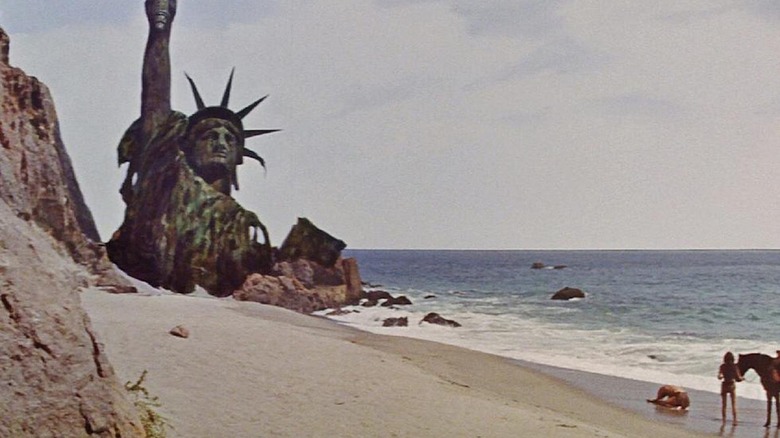Why Greta Gerwig Sees Barbieland As 'Almost Like Planet Of The Apes'
Along with being a four-quadrant blockbuster that, refreshingly, skews unusually female, Greta Gerwig's "Barbie" might be a waking, 114-minute-long nightmare for male chauvinists. And Gerwig might view this as instructive for the whole of humanity.
If this sounds like a perilously heavy lift for a film based on a 64-year-old doll line, keep in mind that writer-director Gerwig and her co-writer Noah Baumbach have been nominated for three Academy Awards (albeit never as collaborators). They're adroit social satirists when they want to be, and smart enough to smuggle in all manner of subversive material.
Also, regardless of how the toy manufacturer views one of its most prized, the aspirational value of Barbie is integral to her greater cultural appeal. With a simple change of apparel, she's allowed girls to dream of being doctors, professional athletes, and Supreme Court justices. This is invaluable, but, for a seeker like Gerwig, there's a flip side to this, one that she felt compelled to investigate in her movie. What would a world ruled by Barbies look like?
Take your impeccably manicured hands off me, you damned dignified Barbie!
In an interview with Rolling Stone, Greta Gerwig was pressed on her repeated use of the term "humanist" rather than "feminist" while discussing her film's point of view. She countered with this fascinating observation:
"Of course, I am a feminist. But this movie is also dealing with [the idea that] any kind of hierarchical power structure that moves in any direction isn't so great. You go to Mattel and it is really like, 'Oh, Barbie has been president since 1991. Barbie had gone to the moon before women could get credit cards.' We kind of extrapolated out from that that Barbieland is this reversed world [where Barbies rule and Kens are an underclass]. The reverse structure of whatever Barbieland is, is almost like 'Planet of the Apes.' You can see how unfair this is for the Kens because it's totally unsustainable."
That's a nuanced perspective that could upset viewers looking for a studio-financed fist-pump about female empowerment, but it's the simple truth. Be it apes or Barbies, any civilization dominated by one particular class is inherently unjust. In "Planet of the Apes," our simian relatives seize control of a world obliterated by nuclear war, and impose a theocracy that assigns species to specific functions while oppressing what's left of humankind. Absolute power corrupts (and destroys) absolutely.
The hope in this particular case is that this realization will shake up moviegoers who thought they were in for two hours of unabashedly silly entertainment. More than being president or an astronaut, Margot Robbie pounding her fist in the sand as she looks upon the ruin of her Malibu Beach House could be Barbie's finest hour.

